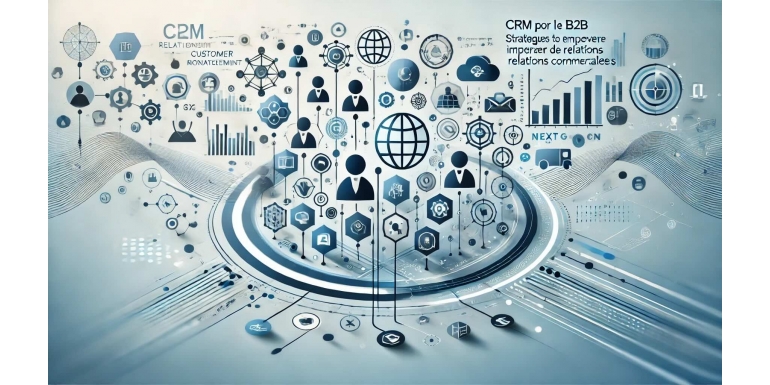
Introduction
In the B2B world, managing business relationships is crucial for long-term success. Companies must not only acquire new clients but also maintain and grow relationships with existing customers to ensure sustainable growth. This is where a Customer Relationship Management (CRM) system plays a fundamental role. A well-utilized CRM can transform how a company manages its customer interactions, optimizing business processes and strengthening long-term relationships. In this article, we will explore how a CRM, particularly Dolibarr, can be used to enhance business relationship management in a B2B context.
1. Centralizing Customer Data for a Comprehensive View
One of the main strengths of a CRM is its ability to centralize all customer-related information into a single system accessible to all departments within the company. For B2B companies, this means having a complete and up-to-date view of each client, including purchase histories, past interactions, quotes sent, signed contracts, and more.
With Dolibarr, companies can centralize this data, making it easier for sales, marketing, and support teams to collaborate. This centralization not only helps in better understanding customer needs and preferences but also allows for more personalized interactions and more responsive service. By having access to detailed and updated information, sales teams can anticipate customer needs, offer tailored solutions, and thereby strengthen the business relationship.
2. Automating Processes to Improve Efficiency
In a B2B environment, where sales cycles are often long and complex, automating processes can significantly improve operational efficiency. A CRM like Dolibarr allows many repetitive tasks to be automated, such as sending follow-up reminders to prospects, automatically creating quotes, or managing marketing campaigns.
Dolibarr offers automation features that enable sales teams to focus on higher-value tasks, such as prospecting or negotiating. For instance, you can set up automated workflows to trigger specific actions based on customer behavior, such as sending a follow-up email after a quote is received or automatically assigning a lead to a salesperson based on predefined criteria.
3. Segmenting Customers for Targeted Marketing
Customer segmentation is essential in a B2B context, where needs and expectations can vary significantly from one company to another. A CRM like Dolibarr allows you to segment your customer database based on criteria such as company size, industry, purchase history, or level of engagement.
This segmentation enables you to personalize your marketing campaigns and communications, addressing specific messages to each customer segment. For example, you can target SMEs with special offers tailored to their needs, while offering more advanced solutions to large enterprises. A targeted marketing approach is not only more effective but also strengthens the relationship with your customers by showing them that you understand their specific needs.
4. Tracking Sales Performance for Better Decision-Making
Another key advantage of a CRM is the ability to track and analyze sales performance in real-time. Dolibarr offers reporting and dashboard tools that allow businesses to monitor key performance indicators (KPIs) such as conversion rates, revenue generated, or customer retention rates.
By using this information, companies can identify areas for improvement and adjust their sales strategies accordingly. For example, if you notice that conversion rates are lower in a certain market segment, you can revise your approach to better meet the needs of that segment. Tracking sales performance also helps optimize resource allocation by focusing efforts on the most profitable customer segments.
5. Enhancing Internal Collaboration for Optimal Customer Service
In B2B, the quality of customer service is often a key differentiator. A CRM like Dolibarr facilitates collaboration between different teams within the company by centralizing customer information and ensuring smooth communication between departments.
For example, support teams can access sales information and past interactions to offer more personalized service and resolve issues more quickly. Similarly, sales teams can collaborate more effectively with marketing teams to align strategies and maximize results. By enhancing internal collaboration, a CRM like Dolibarr helps improve customer satisfaction and foster long-term customer loyalty.
6. Integration with Other Tools for Unified Management
In a B2B environment, it is crucial that the CRM is integrated with other business systems such as ERP, billing tools, or e-commerce platforms. Dolibarr, with its advanced integration capabilities, allows these different systems to be easily connected, offering a unified view of all business operations.
This integration not only simplifies internal processes but also improves data accuracy and reduces errors. For example, integration between Dolibarr and an ERP system enables automatic synchronization of billing and inventory information, ensuring consistent and efficient order management. Unified management of business tools enhances operational efficiency and allows for better customer service.
Conclusion
In the B2B sector, managing business relationships is a crucial element for a company’s success. A CRM like Dolibarr offers a multitude of features to improve customer data centralization, automate processes, segment customers, track sales performance, enhance internal collaboration, and integrate with other business tools. By adopting these strategies, companies can not only improve operational efficiency but also strengthen relationships with their customers and ensure sustainable growth.
